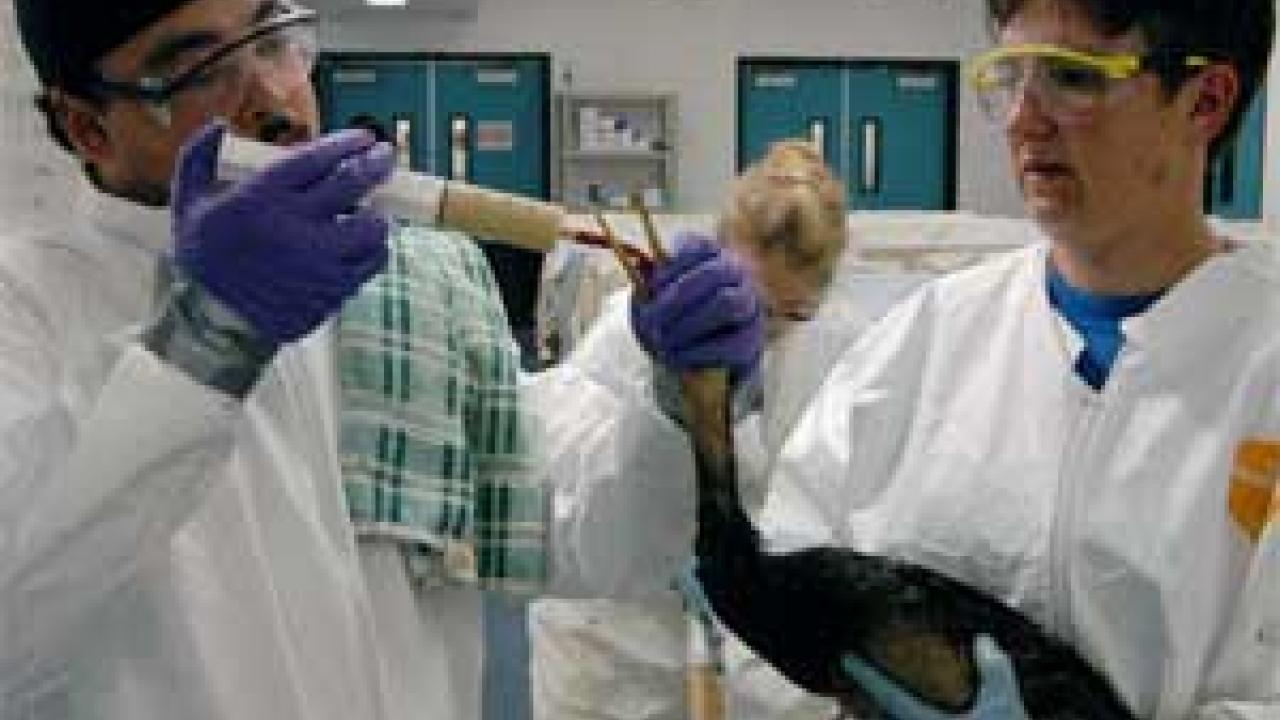Two UC Davis veterinarians who are experts in treating oiled birds and other animals have begun supervising the care of at least 130 birds injured in the Southern California oil spill.
Birds are the only injured animals treated so far.
Veterinarians Dr. Michael Ziccardi and Dr. Greg Massey traveled Wednesday night (Jan. 12) from Davis to Ventura and the Los Angeles Oiled Bird Care and Education Center in San Pedro.
Ziccardi and Massey will evaluate the medical needs of each bird, treat it and supervise its cleaning and recovery.
The veterinarians said tonight that most of the birds are weak and suffering from hypothermia. Some are so ill that they are being euthanized.
The center in San Pedro is one of a series of coastal rescue centers and programs that are collectively called the Oiled Wildlife Care Network. The network is the world's most advanced system of emergency centers for wild animals hurt in oil spills.
The Oiled Wildlife Care Network is managed by the UC Davis Wildlife Health Center, which is part of the UC Davis School of Veterinary Medicine.
Oiled Wildlife Care Network crews being supervised by the UC veterinarians are expected to bring in more birds over the next several days. State oil spill officials said late today that more than 500 oiled seabirds, mostly western grebes, have been observed in the area between Santa Barbara and Venice.
When oil gets on a bird's feathers, the feathers lose their ability to trap air and repel water. As a result, birds can no longer maintain body heat; they become hypothermic; and their need for food increases. At the same time, due to oil on their plumage, birds do not float well; their swimming and foraging ability decreases; and they often cannot fly and will haul out of the water.
Oiled birds typically ingest oil when they attempt to clean their feathers. This ingestion may affect the function of internal organs, immune system and reproductive system.
The network is funded by the California Department of Fish and Game's Office of Spill Prevention and Response. The Fish and Game monies come from interest on the $50 million California Oil Spill Response Trust Fund, which was built from assessments on the oil industry.
The $2.5 million Los Angeles Oiled Bird Care and Education Center was designed to care for up to 1,000 birds that have been coated with, swallowed, or inhaled oil. It was custom-designed according to the expertise accumulated by wildlife veterinarians at UC Davis and the California Department of Fish and Game and by oil-spill-response and rehabilitation personnel.
The 12,000-square-foot center has specialized areas for bird intake, holding, washing, drying, isolation and recovery, as well as for food preparation, medical care and necropsy. Birds will recover in two large pelican aviaries, five smaller wading-bird aviaries or one of eight pools, four of which will contain warm water for quicker healing.
The Los Angeles/San Pedro facility and its sister facility in the San Francisco Bay Area are both operated by the International Bird Rescue Research Center, a non-profit organization dedicated to oil spill response.
